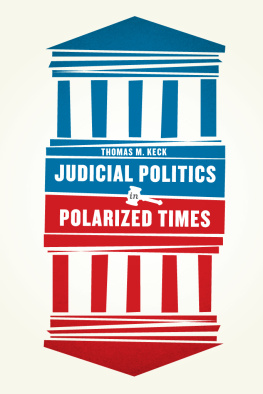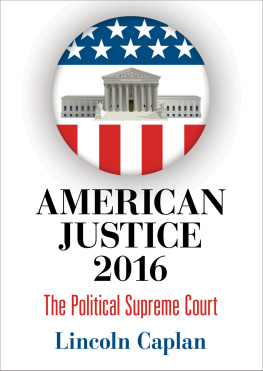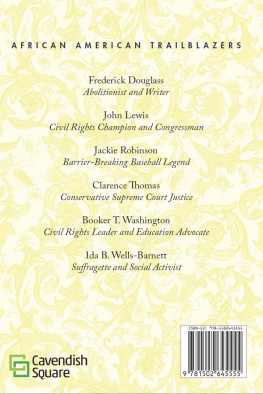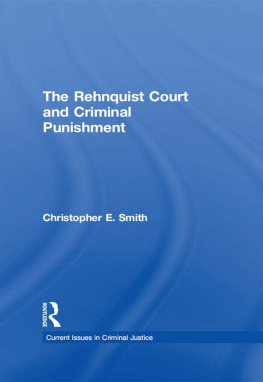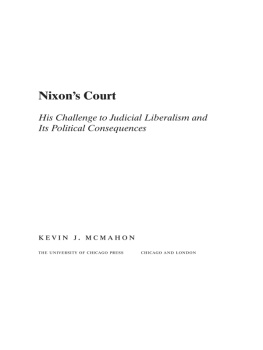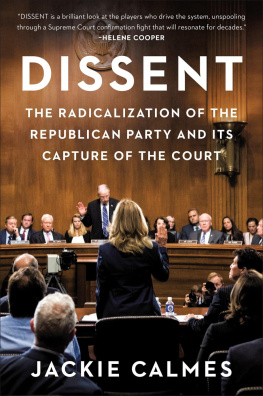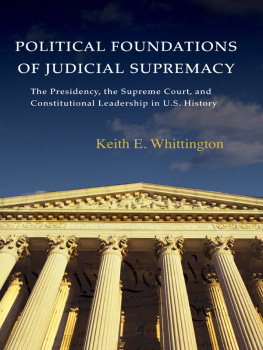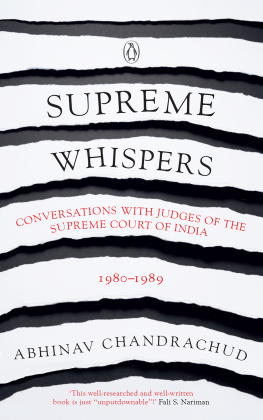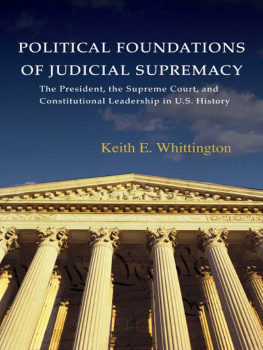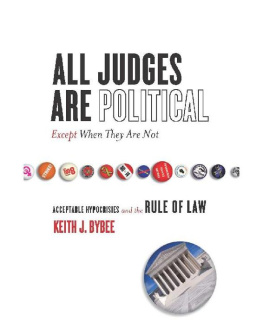THOMAS M. KECK is the Michael O. Sawyer Chair of Constitutional Law and Politics at Syracuse Universitys Maxwell School of Citizenship and Public Affairs. He is the author of The Most Activist Supreme Court in History, also published by the University of Chicago Press.
The University of Chicago Press, Chicago 60637
The University of Chicago Press, Ltd., London
2014 by The University of Chicago
All rights reserved. Published 2014.
Printed in the United States of America
23 22 21 20 19 18 17 16 15 14 1 2 3 4 5
isbn-13: 978-0-226-18238-4 (cloth)
isbn-13: 978-0-226-18241-4 (paper)
isbn-13: 978-0-226-18255-1 (e-book)
doi: 10.7208/chicago/9780226182551.001.0001
Library of Congress Cataloging-in-Publication Data
Keck, Thomas Moylan, author.
Judicial politics in polarized times / Thomas M. Keck.
pages ; cm
Includes bibliographical references and index.
isbn 978-0-226-18238-4 (cloth : alk. paper) isbn 978-0-226-18241-4 (pbk. : alk. paper) isbn 978-0-226-18255-1 (e-book) 1. Political questions and judicial powerUnited States. 2. Judicial processUnited States. I. Title.
kf8775.k43 2014
342.73'04dc23 2014029539
This paper meets the requirements of ansi/niso z39.48-1992 (Permanence of Paper).
This book has been a decade in the making, and I have incurred a great many debts during that time. My intellectual home throughout this decade has been the Maxwell School of Citizenship and Public Affairs at Syracuse University, where my thoughts about the political significance of contemporary courts (and about politics more broadly) have been shaped by countless interactions with colleagues and students.
Many of these students have aided the production of the book more directly, by providing invaluable research assistance. In this regard, I would like to thank Amanda DiPaolo, Cyril Ghosh, Keneshia Grant, Sam Knehans, Yale Leber, Brandon Metroka, Jason Plume, John Ryan, Nilesh Sinha, and especially Richard Price, who has graduated from research assistant to colleague and collaborator. Richard read and provided comments on the full manuscript and taught me much of what I know about state constitutional litigation.
In addition to Richard, a number of friends and colleagues have read and commented on various portions of the manuscript or, in some cases, earlier projects that eventually evolved into this one. I would like to thank Jeb Barnes, Elizabeth Cohen, Kevin den Dulk, David Garrow, Bill Haltom, Ron Kahn, Ken Kersch, Art Leonard, Dan Lipson, Suzanne Mettler, Lisa Miller, Julie Novkov, Sarah Pralle, Grant Reeher, Hans Peter Schmitz, Carroll Seron, Ken Sherrill, Stephen Siegel, Miriam Smith, Jeff Stonecash, Brian Taylor, Steve Wasby, Erika Wilkens, Amanda Winkler, and especially Keith Bybee and Mark Graber. Keith provided detailed comments on multiple chapters, and Mark read the full manuscript not once but twice. The book is immeasurably better as a result of their efforts. It might be better still if I had accepted more of their suggestions. I did not impose the manuscript on my friend Kevin McMahon, but our ongoing collaborative work has shaped my views regarding the law and politics of abortion rights, the influence of the presidency on constitutional development, and much more.
Along the way, I presented early versions of many of the arguments in this book at the Annual Meetings of the American Political Science Association, the American Studies Association, the Association of American Law Schools, the Law and Society Association, the Southern Political Science Association, and the Western Political Science Association, as well as talks at Carleton, Hobart & William Smith, Moravian, and Oberlin Colleges; at DePaul, Grand Valley State, Harvard, Princeton, and Rutgers Universities; and at SUNY Albany. I have not kept track of the panelists and attendees at all of these venues, but I hope some of them will recognize the fruits of their questions and comments in this book.
Once upon a time, this was going to be a book about affirmative action litigation. (It still is a book about affirmative action litigation, but it has grown to encompass abortion, gay rights, and gun rights litigation as well.) At that time, I imposed on a number of participants in the legal and political conflict over affirmative action to talk to me about their experiences. The book project evolved in ways that prevented me from giving those experiences significant attention, but I would nonetheless like to thank Nancy Cantor, Glynn Custred, Michael Greve, Kirk Kolbo, Rick Lempert, and Diane Schachterle for being so generous with their time.
In addition to providing the intellectual environment in which the book was written, the Maxwell School has supported my efforts in more concrete ways. I have been particularly fortunate to have at my disposal the resources of the Michael O. Sawyer Chair for Constitutional Law and Politics, which was endowed by former students of the legendary Michael O. Sawyer. I have lost count of how many times I have been introduced as holder of the Sawyer Chair, prompting a member of the audience to track me down before the event concluded, shake my hand, and introduce herself or himself as one of Michaels students and eternal fans. For those who knew him, I would like to assure you that his legacy lives on at Maxwell, and that we are always happy to hear from you. I have also received invaluable support for my work from Syracuse Universitys Department of Political Science (with a special thanks to my predecessors as department chair, Jeff Stonecash and Mark Rupert), from the Deans Office in the Maxwell School (with a special thanks to Mike Wasylenko, Mitch Wallerstein, and Jim Steinberg), and from the Institute for the Study of the Judiciary, Politics, and the Media (with a special thanks to its director, Keith Bybee). Last but certainly not least, the book would still be unfinished if I had not received support for a year of full-time writing from the American Philosophical Society.
At the University of Chicago Press, John Tryneski has supported this project through many iterations, gently steering me back from several missteps along the way. It has been a pleasure to work with him throughout the process. I would also like to thank Melinda Kennedy, Rodney Powell, Joel Score, Meg Wallace, Lisa Wehrle, and an anonymous reviewer for guiding the project from manuscript to book.
On a more personal note, the pleasures of writing a book for ten years dont always feel like pleasures, and the process would in fact be unbearable were it not for a great community of friends here in Central New York. I hesitate to list folks by name, for fear of repeating Justice Blackmuns mistake with Mel Ott, but here goes: Tanya Bowen and Althea Henry (and Jonah, Kingston, and Jaden!), Tim Brower and Holly Greenberg (and Gulliver and Eisen!), Keith Bybee and Jen Champa (and Evan and Ava!), Joe Cota and Jennifer Waters (and Juliette!), Pete Couvares and Gladys McCormick (and Amelia and Lucia!), Mike Goode and Jolynn Parker (and Dash!), Mary Hageman and Paul Otteson (and Max and Alaira!), Brenden and Lisa Kuerbis (and Henry and Lucy!), Norman Kutcher and Richard Wallach, Katherine Lieber and Katherine Biers, Jen Margulies and Jackie Cuevas (and Avital!), Laurie Marhoefer and Stephanie Clare, Jesse Nissim and Gretchen Purser, Jasmine Pryor and Earl Hardy (and Elodie and Nyla, and go Ravens!), Chris and Heather Scanlon (and Jude, Luke, and Sophie!), and Brian Taylor and Renee de Nevers (and Anatol and Lucian!).

